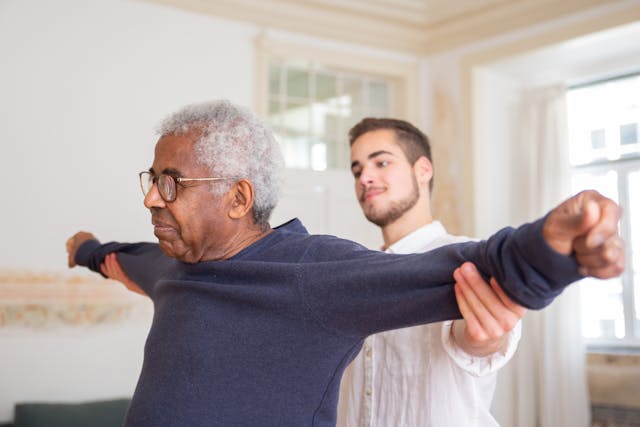Every human is different. Each body, mind, and soul is different and fascinating. Some people are specially gifted. They are special for various reasons. Sometimes it is congenital (from birth), and sometimes it is due to an injury or an accident. Whatever the reason may be, what matters most is the fact that they are no less than any other human in their dignity. They should be considered part of society. It doesn’t matter if they can’t give back to society like others; they are still deserving of respect. People with special needs are very much in need of physiotherapy. It is necessary to ensure their condition stays stable, and if possible, that they acquire mobility affected by their medical issue. Physiotherapy for special needs involves various steps, including a series of different exercises and manipulation of joints and muscles. It helps in enhancing motor skills and improving the quality of life.



Special need conditions for physiotherapy
Physiotherapy is generally about preventing injuries, aiding in recovery, reducing pain and inflammation, and improving overall range of motion. These are done by manipulating different parts of the body. Physiotherapy for special needs involves similar steps aimed at improving the lives of those with disabilities. Various conditions require physiotherapy.
-
- Polio: This is a condition caused by a virus, transmitted through contaminated food or contact with an infected person. In polio, the limbs of the person become paralyzed, reducing mobility. Physiotherapy for this condition involves strength training and passive movement of the affected limbs.
-
- Autism: This is a disorder that impairs the overall development of motor and other skills in a child. For a child with autism, even basic movements are challenging. A child also lacks necessary social skills. Physiotherapy for autism involves helping the child with basic movements such as sitting, walking, standing, and rolling, along with exercises for better mobility.
-
- Down Syndrome: This is a genetic disorder caused by an extra chromosome. It affects the overall development of the child. Visually, Down syndrome gives a distinct appearance with a round face, shorter limbs, and neck. The limbs of a person with Down syndrome lack movement ability due to loose joints and weak muscles.
-
- Dyspraxia: Also known as developmental coordination disorder, in this condition, a child finds it difficult to perform basic tasks such as walking, which may result in falls. This neurological disorder affects the development of motor skills. Physiotherapy for this condition involves assisting with movements and core strength training. Certain physical activities such as dancing and sports also help.
Physiotherapy and Psychological Counselling
For someone with special needs, it is common to experience mental health issues. Their condition affects their quality of life, which can lead to issues such as depression, anxiety, and bipolar disorder. These challenges make it even more difficult for them to engage with society and build social relationships. Physiotherapy helps not only with physical rehabilitation but also with mental well-being. A physiotherapist often provides psychological counseling to the patient, which helps their mental health. Additionally, when the treatment starts to improve mobility, it gives the patient a sense of accomplishment. This creates positivity, and the patient starts feeling better about themselves. This improvement strengthens the overall social relationships between the patient, their friends, and family, and helps in developing new connections.



Caring for special needs conditions
Special needs conditions are quite common. It is essential to be aware of these conditions and how to provide care. While physiotherapy is a must, it is also important to have good knowledge of the condition so that the right care can be sought. A physiotherapist can help by educating the friends and family of the patient on home exercise routines, how to approach the patient, and how to assist with daily activities. Patience is a crucial skill when dealing with someone with special needs. While there is scope for improvement in these conditions, it generally requires a lot of time. Therefore, it is necessary to be patient and maintain a positive attitude toward the patient. This helps the patient be more responsive to treatment and gain confidence in themselves.



People with special needs are very much a part of society. They deserve as much respect as anyone else. They simply require additional care when interacting with them. They are delicate and require a lot of time. Physiotherapy can help people with these conditions by working with them through different exercises and movements. It is essential to be aware of their conditions and to engage with a physiotherapist to get the necessary information about the condition so that, in the absence of the therapist, the patient can be effectively cared for. This is necessary because physiotherapy for people with special needs often runs for a long time, so it is important to discuss the condition with the therapist and gain all the necessary knowledge on how to manage different situations. It is crucial to take the patient’s condition seriously, as only then can the treatment be effective and truly help the patient. While it is true that the treatment takes quite a long time, this is what must be done for the patient to progress and improve in life.
Write and Win: Participate in Creative writing Contest & International Essay Contest and win fabulous prizes.










